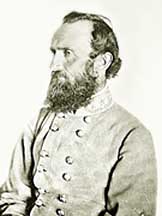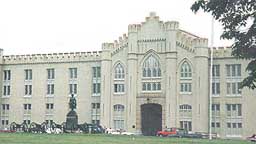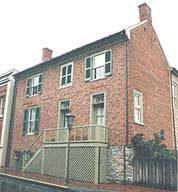
General
Thomas "Stonewall" Jackson:
Life of a Resolute
Soldier in Lexington
 At Virginia Military Institute
(VMI), the following words are inscribed over the archway
of the Barracks: "You may be whatever you resolve to
be." This maxim, simple but true, held special
significance for Thomas Jackson who taught at the
Institute in Lexington for 10 years in the mid-1800s. If
anyone lived by the words in which he believed, it was
this modest professor who—from humble
beginnings—diligently pursued his goals and
accomplished much in his brief but heroic life. During
the Civil War he rose to prominence, becoming the icon
General "Stonewall" Jackson, a great military
leader and an inspiration to the Confederacy. At Virginia Military Institute
(VMI), the following words are inscribed over the archway
of the Barracks: "You may be whatever you resolve to
be." This maxim, simple but true, held special
significance for Thomas Jackson who taught at the
Institute in Lexington for 10 years in the mid-1800s. If
anyone lived by the words in which he believed, it was
this modest professor who—from humble
beginnings—diligently pursued his goals and
accomplished much in his brief but heroic life. During
the Civil War he rose to prominence, becoming the icon
General "Stonewall" Jackson, a great military
leader and an inspiration to the Confederacy.
Thomas Jackson was born in Clarksburg, Virginia (today a
part of West Virginia) on January 21, 1824. As an
orphaned child with little opportunities for a formal
education, Jackson was grateful for his appointment to
the United States Military Academy at West Point in 1842.
Though not a successful student initially, Jackson worked
extremely hard and acquired many words of wisdom by which
to live that kept him going throughout his days of
academic struggle, and even in the years beyond. In his
first semester at West Point, of the 122 students in his
class, Jackson ranked 62nd in mathematics and 88th in
French. But by the time he graduated in 1846, Jackson had
finished 17th place in his class overall.
 Following his graduation, Jackson
fought in the Mexican War. Commissioned second lieutenant
of artillery, he was promoted twice during the war,
holding the rank of Brevet Major at the war's end in
1848. But his success in leading other men on the
battlefield did not wholly transfer to his teaching
career at VMI that began in 1851. The shy, taciturn
professor did not find an easy role as instructor of
"Natural and Experimental Philosophy"
(Physics). Jackson's students considered his method of
teaching eccentric and they did not relate well to their
pedantic professor. However, in teaching artillery
tactics to the cadets, Jackson excelled with the Cadet
Battery on the parade ground in front of the Barracks. Following his graduation, Jackson
fought in the Mexican War. Commissioned second lieutenant
of artillery, he was promoted twice during the war,
holding the rank of Brevet Major at the war's end in
1848. But his success in leading other men on the
battlefield did not wholly transfer to his teaching
career at VMI that began in 1851. The shy, taciturn
professor did not find an easy role as instructor of
"Natural and Experimental Philosophy"
(Physics). Jackson's students considered his method of
teaching eccentric and they did not relate well to their
pedantic professor. However, in teaching artillery
tactics to the cadets, Jackson excelled with the Cadet
Battery on the parade ground in front of the Barracks.
In 1853 Jackson married Elinor Junkin, but a year later
she died giving birth to their stillborn son.
Heartbroken, Jackson grieved over this loss for many
years. He did not find happiness again until 1857 when he
married Mary Anna Morrison. The couple faced their first
tragedy when a daughter born to them in 1858 died a month
later. Early in the next year, the Jacksons moved into
the only home that Thomas would own, a brick town house
within walking distance from the campus where he taught.
The couple lived here quietly and contentedly for two
years, tending to their garden and involving themselves
in church and community activities.
 At the outbreak of the Civil War
in 1861, Jackson left his home in Lexington, his cadets
under his command. Commissioned a colonel in the
Confederacy, he was soon promoted to brigadier general
and proved to be a stalwart leader during the Battle of
First Manassas where he acquired the sobriquet
"Stonewall Jackson." By the end of 1861,
Jackson was promoted to major general. During the next
year, he received recognition for his successes in the
Valley Campaign, the Battle of Second Manassas, the
capturing of the fortress at Harpers Ferry, the Battle of
Antietam, and finally in the Battle of Fredericksburg. On
the battlefield, Jackson had emerged as a master
strategist of battle tactics. And in his personal life,
Jackson celebrated the birth of his daughter Julia Laura
in November 1862. But again, happiness would not endure.
By the next year, "Stonewall" Jackson would
make his final charge at the Battle of Chancellorsville.
For on the evening of May 2, 1863 Jackson was
accidentally shot by one of his soldiers. Though his
severely wounded left arm was amputated, he died of
pneumonia eight days later. At the outbreak of the Civil War
in 1861, Jackson left his home in Lexington, his cadets
under his command. Commissioned a colonel in the
Confederacy, he was soon promoted to brigadier general
and proved to be a stalwart leader during the Battle of
First Manassas where he acquired the sobriquet
"Stonewall Jackson." By the end of 1861,
Jackson was promoted to major general. During the next
year, he received recognition for his successes in the
Valley Campaign, the Battle of Second Manassas, the
capturing of the fortress at Harpers Ferry, the Battle of
Antietam, and finally in the Battle of Fredericksburg. On
the battlefield, Jackson had emerged as a master
strategist of battle tactics. And in his personal life,
Jackson celebrated the birth of his daughter Julia Laura
in November 1862. But again, happiness would not endure.
By the next year, "Stonewall" Jackson would
make his final charge at the Battle of Chancellorsville.
For on the evening of May 2, 1863 Jackson was
accidentally shot by one of his soldiers. Though his
severely wounded left arm was amputated, he died of
pneumonia eight days later.
Jackson's body was brought to Lexington on May 14 where
it lay in state in the classroom at VMI where he had
taught. In honor of their former commander, all day from
sunrise to sunset, the students fired salutes from the
Cadet Battery. The next day, Jackson was buried at the
cemetery in Lexington that was later named in honor of
the fallen Confederate hero. General Robert E. Lee had
lost his "right arm" of the Confederate Army;
there would be no other soldier to replace him.
"Stonewall" Jackson had accomplished much in
his 39 years before his untimely death. Through
persistence and perseverance, he earned respect from his
fellow man and also earned his place in history as a
legendary figure of the Civil War. Though Jackson had
been ridiculed during his lifetime for his unique
personal habits, he had also been admired for his
dedication to duty, his unwavering religious beliefs, and
for his resolute spirit. Jackson believed deeply in the
causes that he supported, and truly understood the maxims
by which he lived. Thus, he transcended the commonplace
by embodying these very words:
You may be whatever you
resolve to be. Determine to be something in the
world, and you will be something. "I
cannot" never accomplished anything; "I
will try" has wrought wonders.
- Reverend Joel Hawes

Top:
Image of "Stonewall" Jackson by Mathew Brady,
courtesy of the National Archives. Middle: VMI Barracks
and parade ground, with Jackson statue and four of the
six cannon of the Cadet Battery, photo by DLO. Bottom:
Home of Thomas and Mary Jackson, photo by CNO.

Journal Index | Previous
Page | Next
Page
Back | Home
Copyright © 2001 - 2009 1st Dragoon's Civil War Site. All rights reserved.
Spider
Map Index
|

 At Virginia Military Institute
(VMI), the following words are inscribed over the archway
of the Barracks: "You may be whatever you resolve to
be." This maxim, simple but true, held special
significance for Thomas Jackson who taught at the
Institute in Lexington for 10 years in the mid-1800s. If
anyone lived by the words in which he believed, it was
this modest professor who—from humble
beginnings—diligently pursued his goals and
accomplished much in his brief but heroic life. During
the Civil War he rose to prominence, becoming the icon
General "Stonewall" Jackson, a great military
leader and an inspiration to the Confederacy.
At Virginia Military Institute
(VMI), the following words are inscribed over the archway
of the Barracks: "You may be whatever you resolve to
be." This maxim, simple but true, held special
significance for Thomas Jackson who taught at the
Institute in Lexington for 10 years in the mid-1800s. If
anyone lived by the words in which he believed, it was
this modest professor who—from humble
beginnings—diligently pursued his goals and
accomplished much in his brief but heroic life. During
the Civil War he rose to prominence, becoming the icon
General "Stonewall" Jackson, a great military
leader and an inspiration to the Confederacy. Following his graduation, Jackson
fought in the Mexican War. Commissioned second lieutenant
of artillery, he was promoted twice during the war,
holding the rank of Brevet Major at the war's end in
1848. But his success in leading other men on the
battlefield did not wholly transfer to his teaching
career at VMI that began in 1851. The shy, taciturn
professor did not find an easy role as instructor of
"Natural and Experimental Philosophy"
(Physics). Jackson's students considered his method of
teaching eccentric and they did not relate well to their
pedantic professor. However, in teaching artillery
tactics to the cadets, Jackson excelled with the Cadet
Battery on the parade ground in front of the Barracks.
Following his graduation, Jackson
fought in the Mexican War. Commissioned second lieutenant
of artillery, he was promoted twice during the war,
holding the rank of Brevet Major at the war's end in
1848. But his success in leading other men on the
battlefield did not wholly transfer to his teaching
career at VMI that began in 1851. The shy, taciturn
professor did not find an easy role as instructor of
"Natural and Experimental Philosophy"
(Physics). Jackson's students considered his method of
teaching eccentric and they did not relate well to their
pedantic professor. However, in teaching artillery
tactics to the cadets, Jackson excelled with the Cadet
Battery on the parade ground in front of the Barracks. At the outbreak of the Civil War
in 1861, Jackson left his home in Lexington, his cadets
under his command. Commissioned a colonel in the
Confederacy, he was soon promoted to brigadier general
and proved to be a stalwart leader during the Battle of
First Manassas where he acquired the sobriquet
"Stonewall Jackson." By the end of 1861,
Jackson was promoted to major general. During the next
year, he received recognition for his successes in the
Valley Campaign, the Battle of Second Manassas, the
capturing of the fortress at Harpers Ferry, the Battle of
Antietam, and finally in the Battle of Fredericksburg. On
the battlefield, Jackson had emerged as a master
strategist of battle tactics. And in his personal life,
Jackson celebrated the birth of his daughter Julia Laura
in November 1862. But again, happiness would not endure.
By the next year, "Stonewall" Jackson would
make his final charge at the Battle of Chancellorsville.
For on the evening of May 2, 1863 Jackson was
accidentally shot by one of his soldiers. Though his
severely wounded left arm was amputated, he died of
pneumonia eight days later.
At the outbreak of the Civil War
in 1861, Jackson left his home in Lexington, his cadets
under his command. Commissioned a colonel in the
Confederacy, he was soon promoted to brigadier general
and proved to be a stalwart leader during the Battle of
First Manassas where he acquired the sobriquet
"Stonewall Jackson." By the end of 1861,
Jackson was promoted to major general. During the next
year, he received recognition for his successes in the
Valley Campaign, the Battle of Second Manassas, the
capturing of the fortress at Harpers Ferry, the Battle of
Antietam, and finally in the Battle of Fredericksburg. On
the battlefield, Jackson had emerged as a master
strategist of battle tactics. And in his personal life,
Jackson celebrated the birth of his daughter Julia Laura
in November 1862. But again, happiness would not endure.
By the next year, "Stonewall" Jackson would
make his final charge at the Battle of Chancellorsville.
For on the evening of May 2, 1863 Jackson was
accidentally shot by one of his soldiers. Though his
severely wounded left arm was amputated, he died of
pneumonia eight days later.